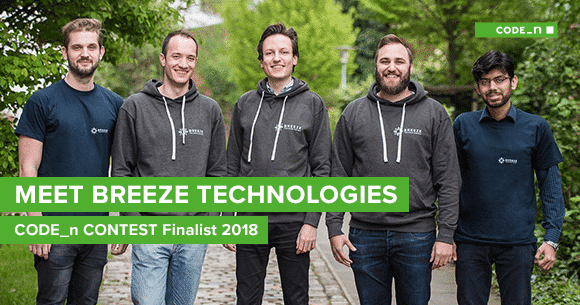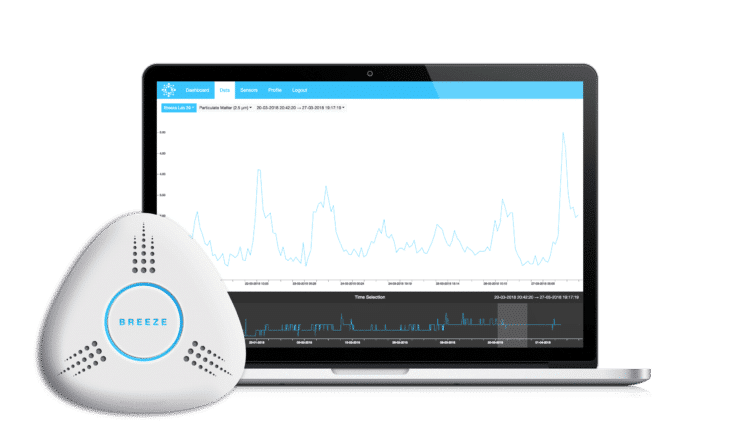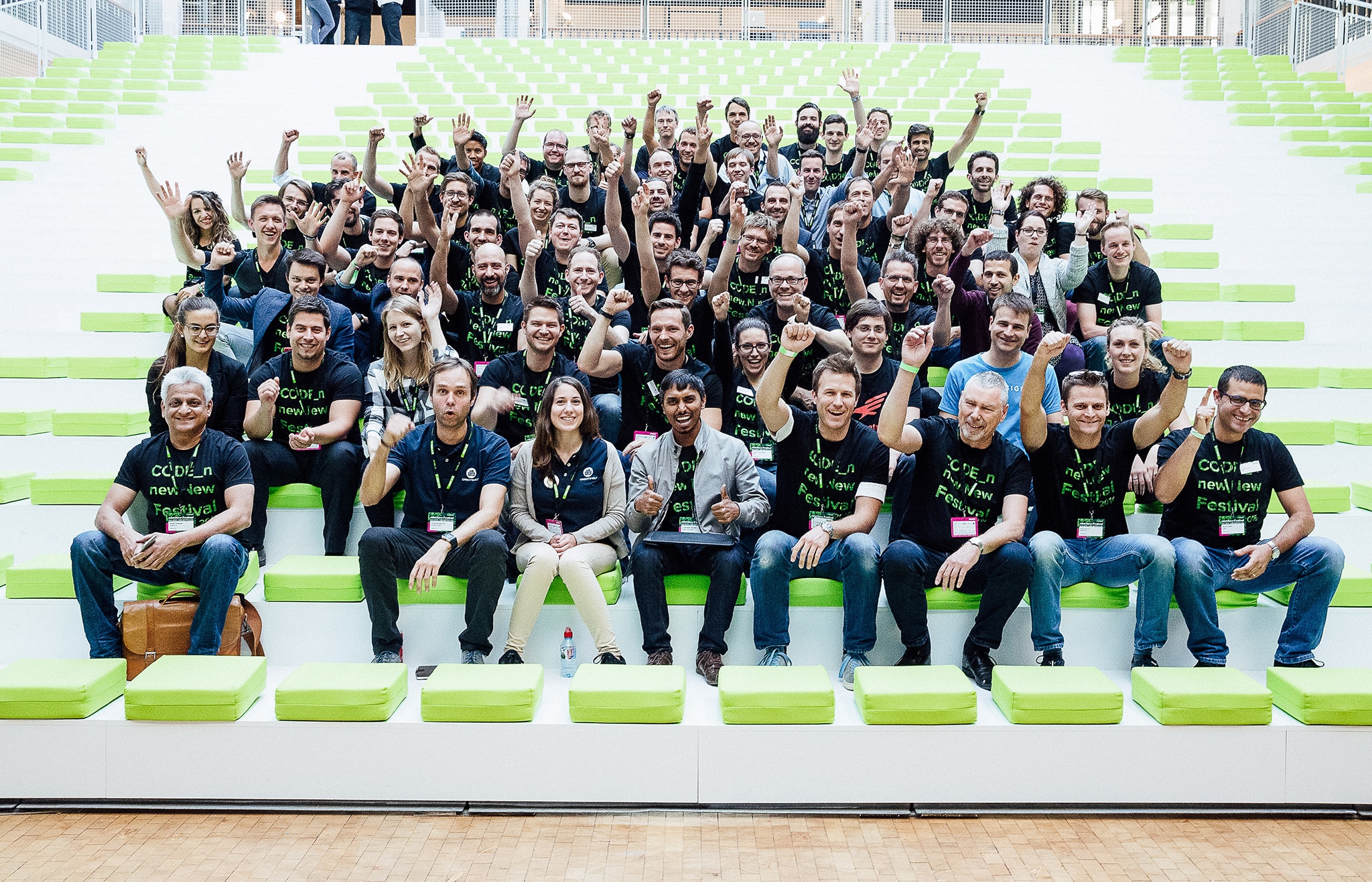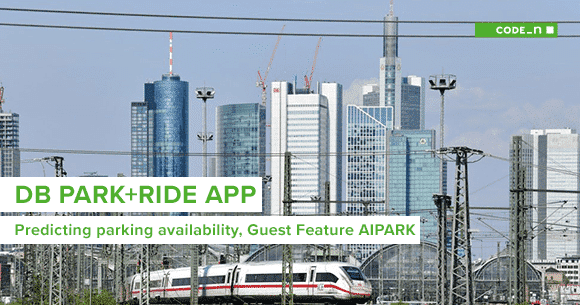MEET OUR CODE_N CONTEST FINALISTS 2018: Breeze Technologies from Germany
 Clear the stage for.. Breeze Technologies! The CODE_n CONTEST Finalist from Germany pushes the limits of environmental sensor development with the help of big data and machine learning. The Team around the co-founders Sascha Kuntze and Robert Heinecke makes a great effort in developing small-scale air quality sensors that can measure common pollutants like carbon and nitrogen oxides, ozone, particulate matter and many more. Breeze Technologies’ interdisciplinary team consists of scientists, analysts, engineers, designers, computer scientists and former consultants with international work experience and it claims to fight for more liveable cities all over the world! Learn more about their mission in the interview with CEO and co-founder Robert Heinecke. Enjoy!
Clear the stage for.. Breeze Technologies! The CODE_n CONTEST Finalist from Germany pushes the limits of environmental sensor development with the help of big data and machine learning. The Team around the co-founders Sascha Kuntze and Robert Heinecke makes a great effort in developing small-scale air quality sensors that can measure common pollutants like carbon and nitrogen oxides, ozone, particulate matter and many more. Breeze Technologies’ interdisciplinary team consists of scientists, analysts, engineers, designers, computer scientists and former consultants with international work experience and it claims to fight for more liveable cities all over the world! Learn more about their mission in the interview with CEO and co-founder Robert Heinecke. Enjoy!
Lisa: Hi Robert, what is Breeze Technologies all about?
Robert: Breeze Technologies provides an environmental intelligence platform that offers hyperlocal, comprehensive and accurate air quality data, as well as insights and actionable recommendations. Our platform integrates a multitude of public and private air quality data sources, as well as our own affordable air quality sensors. The collected data is then aggregated and assimilated through different applications. Smart algorithms evaluate the data in real time, suggest the most efficient and effective air quality improvement measures from a catalogue of more than 3.500 measures, connect customers to intervention partners and track the success of implemented and ongoing interventions for both smart buildings and cities. Through APIs we then also enable corporates and cities to leverage environmental data as part of their value chain.
Lisa: How did you come up with the idea?
Robert: Back in winter 2014, when I was living and working in Istanbul, I made my first experiences with heavy urban air pollution. Istanbul has a particular problem with many pollution sources and special weather effects, leading to heavy smog. On some days, the air pollution was so bad that I could not even see the other side of the street anymore! As a then-management consultant, I went to study the data and soon found out that today’s decision makers do not have enough data to both track air quality extensively enough, as well as to judge the effectiveness and efficiency of mitigation strategies. The idea for Breeze was born: generating hyperlocal air quality data with low-cost sensors combined with a smart data platform that provides insights and recommendations.
Lisa: What are you trying to solve?
Robert: Air pollution is the single biggest environmental health threat of our time, killing 7 million people and costing the world economy 5 trillion USD per year. Yet, you cannot manage what you cannot measure and cities and businesses have been relying on vague estimations and uncertain assumptions in the last decades. Until now, there have been no solutions to effectively monitor air quality and offer tailored solutions to local challenges. Sensing devices have been too big, complex and expensive and decision-makers have been left alone with the data, which requires scientific knowledge to understand and interpret. Additionally, there has been no knowledge transfer process for successful interventions. We only expect air pollution challenges to grow as public awareness rises. It is time to find sustainable solutions, and the Breeze Environmental Intelligence Platform is our contribution towards more livable buildings and cities.

Lisa: Your startup addresses one of Europe’s most pressing challenges- air pollution, who are your customers/ target audience? Could you give us some examples of how your technology helps your customers?
Robert: It is our long-term goal to make our cities, buildings and communities more livable through the smart use of environmental data. To achieve this, we are focusing on both building as well as municipal management. The biggest issue is the lack of enough reliable data and ways to effectively deal with it. This is why we provide hyperlocal air quality and climate data through integrating data from low-cost sensors we place in the streets with external data sources like satellite data. We thereby give the municipal decision makers, like a mayor’s office, access to a holistic view on their urban air quality. Combining this data with a state-of-the-art artificial intelligence, we then recommend effective and efficient interventions to raise local air quality, thereby helping municipalities to better use their budgets for clean air actions. We do not stop there: As we spend 90% of our time indoors, we also focus on these places. For office environments, meeting rooms and event spaces, we provide indoor air quality sensors that gather environmental data that is then calibrated and analyzed in real time. We notify the facility management if there are any issues and provide suggestions to create a healthier and more productive working environment. Through different apps, we can also engage the room occupants themselves and enable them to take immediate actions to improve indoor air quality.
Lisa: Thank you for the interview, Robert!
Meet Breeze Technologies at the new.New Festival 2018 this fall, in Stuttgart!






Write a comment